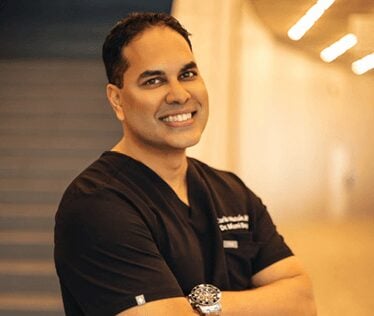Dr. Tarik Husain is one of Florida’s top plastic surgeons. Husain is president of the Miami Society of Plastic Surgeons and specializes in many procedures, including abdominal etching. In this candid interview, Dr. Husain—also known as Dr. Miami Beach—talks about his time in the military, serving troops fighting in Iraq and Afghanistan, as well as what his position in the Miami Society of Plastic Surgeons entails. He also talks about Brazilian butt lifts, one of the trendiest and most controversial plastic surgery procedures today, tackling why it’s so popular and how the procedure can be performed safely.
Q. BBLs (Brazilian butt lifts) are one of the trendiest surgeries, but the news is riddled with nightmare accidents and botched experiences. Can you explain the surgery and why are patients consistently having issues?
A. BBL or Brazilian Butt Lift is probably the most controversial plastic surgical procedure that exists today. It has the highest death rate of any aesthetic surgery (reportedly as high as 1 in 3,000 patients but this is not the rate when the surgery is done correctly). Even the name, BBL, is confusing.
First and foremost, be wary of clinics that perform a high volume of BBL’s per day. A surgeon should only be performing 2 to 3 BBL’s per day maximum and not 10 per day by a single surgeon which is done in certain clinics, and which I do not agree with given the potential complications.
Second, to perform the surgery correctly the fat should be injected above the muscle and not in the muscle. To add extra safety to the procedure, an ultrasound may be used to visualize where the fat is injected. That way, it is not injected into a large blood vessel which may cause a fat embolus (a piece of fat traveling to the lungs).
Third, I do not like the term “Brazilian Butt Lift.” Does it make sense that a “Brazilian” butt lift is done in Miami, or who happens to say “Brazilians” have the best butts. Call it what it is. My chapter written on this subject is not titled “Brazilian Butt Lift,” but instead titled “Autologous Fat Transfer to Buttocks.” In simple terms, this means taking your own fat to augment your buttocks. Unlike breast augmentation where we use implants routinely, implants in the buttocks have a higher complication rate, therefore fat injections are safer. Also, you don’t sit on your breast implants for several hours at a time! The procedure itself gets a bad reputation, but if done correctly by a competent plastic surgeon who adheres to intra-operative safety, it is a very satisfying procedure. Some surgeons have even recommended banning BBL’s, but again the procedure should not be banned (which also sets a very poor precedent), but surgeons should follow a certain protocol, be board certified in plastic surgery, and it should only be done in accredited surgical facilities.
Q. You are known for your abdominal etching and have received worldwide acclaim for your work. Do you encourage women to have this surgery, or do you think that etching is better for men?
A. Abdominal etching seems be everywhere these days, but I started performing abdominal etching approximately 10 years ago when it was relatively unknown. I am fortunate enough to have done several hundreds of these surgeries. It is a very advanced form of liposuction and should only be done by those who are highly experienced in this high stakes procedure because an “indent” in the abdomen is not easy to correct. I have done an almost equal number of abdominal etching surgeries in males and females as published in my scientific and surgical technique paper. In almost all cases, males want the “six pack” look, and most females want a more feminine and softer “vertical line” appearance. Both sexes usually desire the “V-lines” or the diagonal hip lines. In a few rare cases, a female may desire the “six-pack” look. I encourage both sexes to have a high-definition abdomen if that is what makes them feel happy about their abdominal aesthetics!
Q. What do you think the is the next big thing in surgery for women?
A. I think the next big surgery for men and women alike is going to be elective limb lengthening. This is a surgical procedure to make people taller. I will be offering this surgery very soon. If somebody is born short, there is no amount of exercise or nutrition that can change that. Just like a women born with small breasts, should have the option to have larger breasts, I want people who are born a “short” height to achieve an “increased” height.
Q. We know you are a veteran; how do you think that experience helped you become a better plastic surgeon?
A. The Army trained me to become a surgeon without fear, be as well-read and best prepared for every surgery before the case, and intra-operatively to be decisive/instinctive in the operating room. When I compared myself to civilian surgeons, after leaving the military, I found many surgeons operate defensively. This means they operate out of the fear of being sued. Although I find it of utmost importance to follow the standard of care for every surgery, I also know you cannot operate effectively if you operate based upon fear. A surgeon operates on confidence, and that’s probably the best intangible I gained after being an Army surgeon. In my training, if we went into a surgery unprepared, meaning not knowing the anatomy or the latest medical evidence, we were shamed in front of other surgeons. When I say shamed, I mean we literally had to write our names on the board as if we were in kindergarten as a form of motivation to come back the next day and present to a room full of surgeons that you completed your homework and updated your knowledge base. Finally, all the homework for surgery needs to be done beforehand, but a certain aspect of being a surgeon is an innate ability and instinctiveness.
Surgery requires hand/eye coordination and just like sports, you can train and practice, but sometimes you will be placed into a situation that requires your intuition and instinct despite all your previous studying and practice. I treated the worst trauma in the world when treating our soldiers from Iraq and Afghanistan. No amount of reading nor practice could have prepared me for every surgery I would have to perform on our injured military personnel. I was fortunate to develop that instinctiveness and intuition that is required of a mature surgeon.
Q. You are known as Dr Miami Beach how did you get that name?
A. I walked out of my car in Miami Beach one day, dressed in scrubs. I passed by a group of people, one of whom asked if I’m “Dr. Miami?” Without a second hesitation I said “No, I’m Dr. Miami Beach.” From that point forward, I considered myself to be “Dr. Miami Beach,” and that became my Instagram name (IG: dr.miamibeach), which fortunately has one of the largest followings in the country at this point.


Q. As the president of the Miami Society of Plastic Surgeons, part of your platform is safety. How are you educating patients in finding the right doctor?
A. As the President of the Miami Society of Plastic Surgeons, my biggest responsibility has been patient safety. I do my best to inform patients of how to find a plastic surgeon who looks out for their patient in terms of safety and ethics. Many plastic surgeons in Miami do not see their patients before surgery, nor after surgery. Some even do not adhere to intra-operative safety measures. Some clinics perform “bait and switch,” which is luring an out of state patient into Miami for surgery, and on the day of surgery, stating that surgeon is not available, and a different surgeon will be performing the surgery. Many times, a single surgeon may be overseeing more than one operating room with “ghost surgeons” doing the majority of the work. In order to minimize patient homework in terms of finding a safe and competent plastic surgeon, a patient just has to go to miamisps.com, which includes only plastic surgeons of the highest degree of reputation in Miami. This list is limited to only about 20 to 30 plastic surgeons, and is a very elite society, which has extremely strict membership requirements, the minimum of which is to be a board-certified plastic surgeon.












